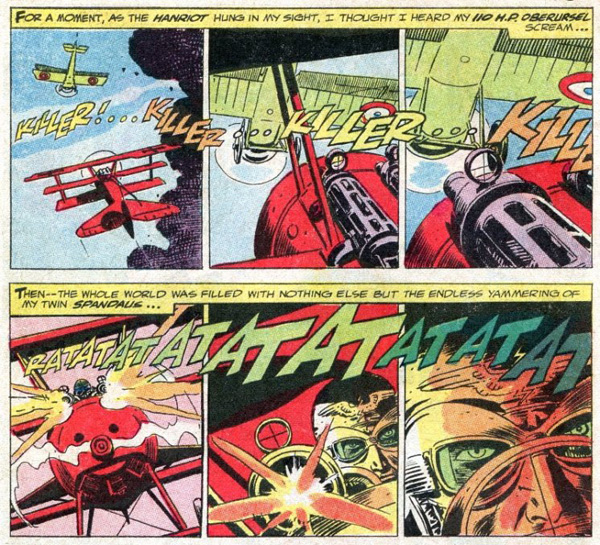Joe Kubert, 1926-2012

DC Comics
I was saddened yesterday afternoon to hear about the death of the comic book artist Joe Kubert. Although I came of age about a decade too late to be reading Kubert’s work when it came out, I did see a lot of references to those comics, especially Sgt. Rock—but once I had a chance to catch up with the stories, I actually leaned more towards the doomed German WWI fighter pilot Enemy Ace, from which the brief excerpt above is taken.
If you get the chance, you should track down the DC Showcase editions for those two characters; the stories are filled with one amazing example after another of Kubert’s cinematic approach to laying out a story in sequential panels. The example I’ve chosen is fairly conservative; in other stories, Kubert could produce stunning layouts that presented “close-up” panels embedded within larger panoramas, nimbly calling attention to the most important story elements while—and this is crucial—not being so virtuosic that you’d be paying attention to him rather than the story. He also had a wonderful eye for historical detail, which you’ll see in every page. He did do superhero comics at various points throughout his career, but there’s a realistic tone to his best work that… well, when I first started getting into it, the closest comparison I could come up with to explain it to other people was the equally great Will Eisner.
During his lifetime, Kubert founded a school for cartooning and graphic arts, which became a training ground for artists like Tim Truman, Steve Bissette, Rick Veitch, and Amanda Conner. He also raised two sons, Andy and Adam, who are themselves accomplished comics artists; in fact, Kubert’s last gig appears to be inking Adam’s pencils on one of DC’s Watchmen prequels. I haven’t actually read any of it, but the artwork I’ve seen online has an old-school vibe I suspect fits the project well.
13 August 2012 | obituaries |
Howard Zinn, 1922-2010
 It was just a little over a month ago that I encouraged you to watch The People Speak, a series of performances based on historical documents that had been collected by Howard Zinn in Voices of a People’s History of the United States. As I was finishing up work today, I was saddened to hear that Zinn died of a heart attack earlier; I had been inspired by many of his books, but most especially his memoir You Can’t Be Neutral on a Moving Train because, when I read it in my late 20s, it was a testament of living true to one’s values that told me exactly what I needed to hear at the time I read it.
It was just a little over a month ago that I encouraged you to watch The People Speak, a series of performances based on historical documents that had been collected by Howard Zinn in Voices of a People’s History of the United States. As I was finishing up work today, I was saddened to hear that Zinn died of a heart attack earlier; I had been inspired by many of his books, but most especially his memoir You Can’t Be Neutral on a Moving Train because, when I read it in my late 20s, it was a testament of living true to one’s values that told me exactly what I needed to hear at the time I read it.
Zinn’s version of American history is not the polite version most of us were taught growing up; on the other hand, because he was relentless in championing alternative perspectives, that version has become more commonly known. If you haven’t read A People’s History of the United States yet, I highly recommend it—if you don’t wind up agreeing with Zinn, he should at the very least drive you to question your assumptions.
27 January 2010 | obituaries |

 Our Endless and Proper Work is my new book with Belt Publishing about starting (and sticking to) a productive writing practice.
Our Endless and Proper Work is my new book with Belt Publishing about starting (and sticking to) a productive writing practice. 
